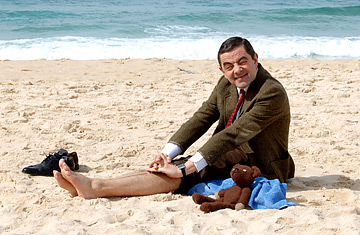
British comedian Rowan Atkinson as his alter ego Mr. Bean poses for photographs as he sits on the sand at Bondi Beach in Sydney.
Has Mr. Bean come to an end?
Mike Stevens, NEW YORK CITY
I get the feeling that Mr. Bean's Holiday might be the last. But I probably said that 10 years ago, after the first movie. [Laughs.] When you get into your 50s, as I am now, there is a slight risk that you will start to look a bit geriatric. I have always regarded Mr. Bean as a timeless, ageless character, and I would rather he be remembered as a character mostly in his 30s and 40s.
Is the character based on yourself, or is it all just random improvisation?
Paul Nettleship, MONTREAL
He is sort of an alter ego of mine. Mr. Bean is my natural organ of expression when I am told to be funny in an entirely visual way. We do have periods of improvisation, but that tends to happen during rehearsal rather than on the studio floor.
Why does his humor translate so well across cultures?
Courtney Brown, NEW YORK CITY
It is on the level of a child really. Mr. Bean is essentially a child trapped in the body of a man. All cultures identify with children in a similar way, so he has this bizarre global outreach. And 10-year-old boys from different cultures have more in common than 30-year-olds. As we grow up, we acquire this sensibility that divides us.
Why isn't Mr. Bean's classic teddy-bear companion with him in the movie?
Zhao Yin, SHANGHAI
Sadly, Teddy has disappeared in the movies. While he was a companion on the TV show, the movies have a fish-out-of-water feel in which Mr. Bean is taken out of his familiar environment. We didn't want him to have any crutches to lean on, so we felt a need to jettison the teddy bear.
Do you prefer speaking or nonspeaking roles?
Anna Kim, SYDNEY
Mr. Bean is at his best when he is not using words, but I am equally at home in both verbal and nonverbal expression. I have done a number of speaking roles, most loquaciously in a sitcom called Blackadder.
You are often compared with Charlie Chaplin. Did his comedic style influence you?
Moroke Makgalemele
JOHANNESBURG
I did watch him growing up but not a lot. Even Buster Keaton, who people say I am reminiscent of, I really never saw at all. I consider myself more of a visual comedian than a physical one. Chaplin was an incredible acrobat and a real circus performer. I am not. I am actually quite physically challenged. [Laughs.]
Did you ever overcome your serious stutter?
Julia Shepard, CHICAGO
It comes and goes. It depends on my nerves, but it can be a problem. I find that when I play a character other than myself, the stammering disappears. That may have been some of my inspiration for pursuing the career that I did.
I heard that you like collecting exotic cars. Do you have a favorite?
Callie Matthews, BOISE, IDAHO
I enjoy racing historic motorcars from the '50s and '60s. The seed of my interest was planted when I was about 12 years old and took over my mother's Morris Minor. I drove it around my father's farm. But my favorite car is still a McLaren F1, which I have had for 10 years.
You studied engineering at Oxford. How did you make the transition to acting?
Soumendu Das, PHOENIX
In many ways, Oxford was a deliberate way of going into acting. I wanted to extend my student life for as long as possible in the hope that I could explore performing as a career. And that hobby slowly turned into a job. I think engineering is great, and I would do it again. But I knew long before I handed in my thesis that I would not make any use of it.
Are you hilarious off screen?
Shashindra Muniandi
YOKOHAMA, JAPAN
Definitely not, as this interview is probably proving. [Laughs.] Funny things tend not to happen to me. I am not a natural comic. I need to think about things a lot before I can be even remotely amusing.
For more from Atkinson and to subscribe to the 10 Questions podcast on iTunes, go to time.com/10questions
